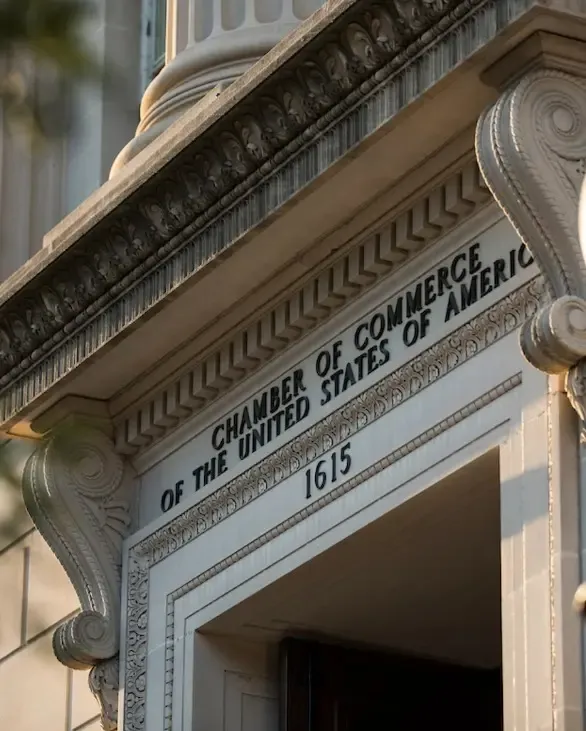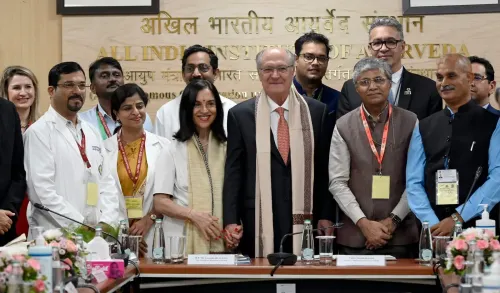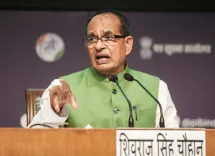Is the Trump Administration's H-1B Visa Fee Unlawful?

Synopsis
Key Takeaways
- US Chamber of Commerce has filed a lawsuit against the Trump administration.
- The lawsuit challenges the $100,000 H-1B visa fee.
- The Chamber argues the fee is unlawful and harmful to businesses.
- Trump's proclamation may hinder hiring of skilled foreign workers.
- Confusion arose regarding the impact on current H-1B visa holders.
Washington, Oct 17 (NationPress) The US Chamber of Commerce, the largest business organization in the nation, has initiated legal action against the Trump administration regarding the controversial $100,000 H-1B visa application fee, which they assert is illegal.
In a lawsuit lodged in a district court in Washington on Thursday, the plaintiff contended that this visa fee, if enforced, would “cause significant damage to American businesses” and compel them to “either substantially raise their labor expenses or employ fewer highly skilled workers for whom local alternatives are not easily accessible.”
The organization further claimed that Trump’s proclamation issued on September 19 is “clearly unlawful” and serves as a “benefit to America’s economic adversaries.”
“The Proclamation represents not only poor policy; it is unequivocally unlawful. Although the President possesses considerable authority over the admission of noncitizens into the United States, that authority is constrained by law and cannot contradict statutes enacted by Congress,” it stated.
Neil Bradley, Executive Vice President of the US Chamber of Commerce, remarked that the visa fee would render it “impractical for US employers” to “tap into global talent,” stressing that the US economy “needs more workers, not fewer.”
The Chamber encompasses around 300,000 direct members and indirectly represents the interests of over three million businesses and professional organizations across the United States.
This marks the second significant domestic legal challenge to the newly proposed H-1B regulations, following a lawsuit from a coalition of unions, education professionals, and religious organizations against the Trump administration on October 3.
In a separate lawsuit filed in the Northern District of California, the plaintiffs argued that Trump’s proclamation was fraught with “numerous inaccuracies” and “overlooks the advantages of the H-1B visa program for the American economy.”
The lawsuit also emphasized that the $100,000 visa application fee was “unprecedented, unjustified, and illegal.”
Among the plaintiffs were various immigration and advocacy groups, including the Justice Action Center, South Asian American Justice Collaborative, and Democracy Forward Foundation.
When signing the proclamation in September, Trump claimed the “motive is to hire American workers.”
Commerce Secretary Howard Lutnick defended the initiative, asserting that the policy would dissuade companies from hiring international workers.
“Thus, the essence is that these large tech firms or other major companies will no longer train foreign workers. They must pay the government $100,000, then compensate the employee. This is simply not feasible. Instead of hiring from abroad, let’s train recent graduates from our esteemed universities here at home. That is the policy. $100,000 annually for H-1B visas,” he elaborated.
The proclamation generated widespread confusion as it implied that it might affect existing H-1B visa holders, who could encounter challenges returning to the United States.
The White House clarified on September 20 that this is a “one-time fee” applicable only to new visas and does not affect renewals or current visa holders.
Shortly thereafter, the US Department of Homeland Security (DHS) also suggested changes to its regulations governing the H-1B visa process.
The DHS proposal aimed to eliminate the current lottery system and introduce a weighted selection process that they claim would prioritize the distribution of H-1B visas to more skilled workers.
Workers from India accounted for more than 70% of the total approved H-1B visas in 2024, primarily due to a substantial backlog in approvals and a high volume of skilled immigrants from India.









